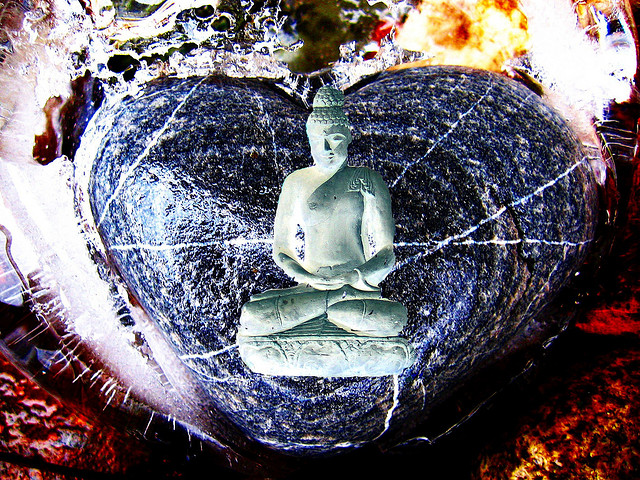Tired of the same old story?
Feeling that despite all the personal work you’ve done, you still find yourself in the same predicaments? The same old dramas, relationships, and stories playing out again and again?
Why does this keep happening? How did I not see this coming? Not this again!
How can it be that even when we’re doing the work and becoming more conscious and self aware, the stories continue to play out, albeit less and less painfully?
These dramas, personal movies, and repeating stories are known in the Buddhist tradition as samsara: the habitual patterns of suffering that we create and cycle through for endless time. Samsara is both our perception of ourselves and our world and is created from our personal karma. It is like being so completely absorbed in a movie or dream that we forget what’s real and what’s not. Isn’t it crazy to think that we’re all doing this all the time and don’t stop to question it?
The Buddha’s teachings can help us loosen the grip on how tightly we hold on to these stories and get more familiar with the truth of who we really are. The teachings and practices help us see that since we are creating the dramas, we can also change them. For me, this all made sense in theory, but to live as if it were so is much harder to sustain. It’s like trying to see behind you’re own eyeballs—the projector of the movie is so unconscious that you don’t realize it’s happening until something shakes you up.
Maybe some people have a flash and that’s it—they abide in their Buddha nature. For me, however, elephant that I am, it’s a slow and steady path. The moment it occurs to me that I’m in the same old story, the best I can do is do something different than I did the last time. In other words, one way to interrupt the cycle is to stop reacting in our predictable ways. Learning to work with our emotional reactivity is one way to shift the momentum, interrupt the movie, and realize that we have some choice in how things go down, even when it feels like it out of our hands.
The repeating story in my life is much like “The Emperor with No Clothes.” I keep finding myself like the little boy who is in the predicament of bringing attention to things people don’t want to see, getting shunned, and then suffering great loss. After going through this so many times over, starting with family, and moving on from there, I decided the job was too painful and I would give it up altogether. Even with conscious determination and years of practice, I still find myself in the wrong place at the wrong time judging things I am not “supposed” to. Rather than reacting, my practice these days is having compassion towards myself for seeing, for the one who doesn’t want to be seen, and for everyone else involved who would prefer not to see at all. For me, it relieves the pressure of feeling like I have to do the same old, same old.
Learning how to work with our emotional reactivity and channel it into compassion for others is what the Buddhist teachings are all about. The energy of our emotions is what creates the color and richness of our personal dramas and makes them so enticing. The problem is that it is also what gets in the way our ability to step back and relax into our true nature.
The Buddha taught that the first emotion to work with is ignorance. Many people don’t think of “ignorance” as an emotion, but it is important to learn about since it is at the root of all the other emotions. Ignorance is why we keep going down the wrong road and repeating the same old stories. We keep looking outside of ourselves for happiness only to come up empty handed. Contemplating our ignorance is not to get down on ourselves, but rather to stop putting our energy into what is not working. Rather we start to get curious about what it is we truly want and what can genuinely help us. This is how we cut through ignorance and pull up the roots of our personal karma. We learn to slow down, pause, and look inside where our true riches can be found.
We realize joyfully that true happiness and peace can actually be achieved within our own heart.
Relephant read:
Opening up about Habitual Patterns: The Pendulum Swing.
~
Author: Tina Fossella, MFT
Editor: Travis May
Photo: Flickr/Hartwig HKD











Read 0 comments and reply